

Senior School Curriculum Guide 2024

 Cathedral College Wangaratta
Cathedral College Wangaratta

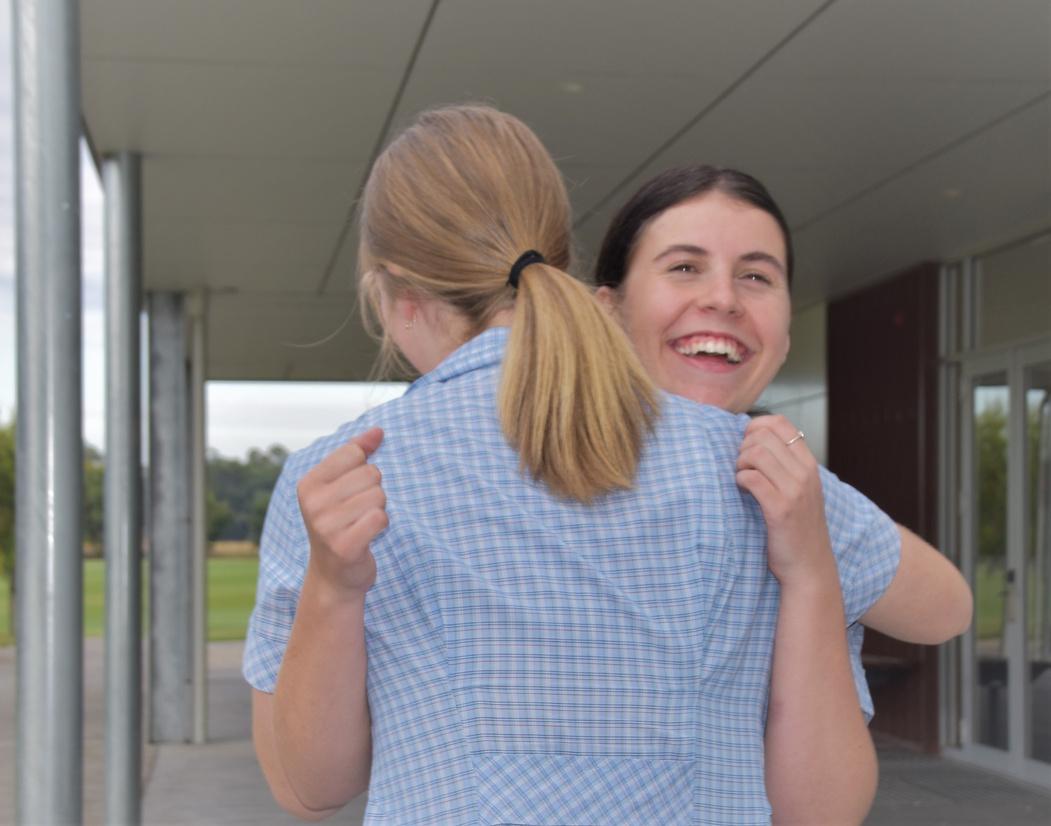

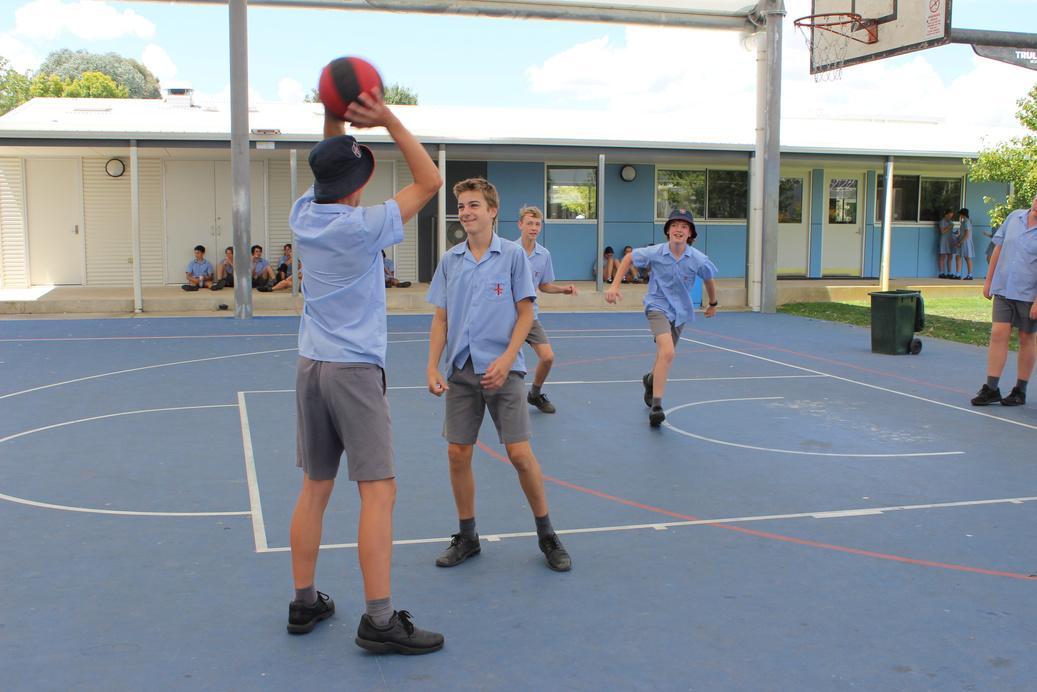
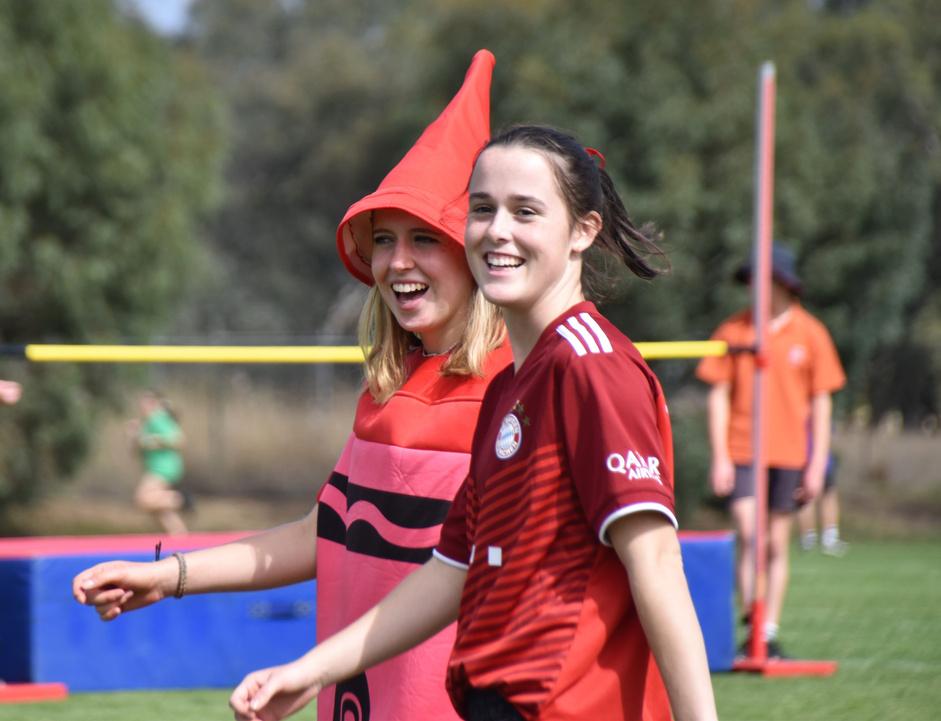

FromtheDirectorofStudies
"Educationisthemostpowerfulweaponwhichyoucanusetochangetheworld."- Nelson Madela
As a Prep to Year Twelve school, Cathedral College Wangaratta can ensure the highest possible educational outcomes for our students by providing a sequential and progressive curriculum taught using current pedagogy The academic care of every student sits alongside our wellbeing programs as the highest priority Our staff are committed to ensuring students learn in a positive and safe learning environment
The Middle Years of schooling offer students a broad range of core and elective subjects to explore and discover which subjects they would like to pursue in the future At the same time, students gain an understanding of how they best learn and how this may be useful in a future workforce The Senior years of schooling are an opportunity for students to narrow down their subject choices and build upon their strengths and interests We all work best when we are motivated and interested and giving students the opportunity to select subjects helps students to navigate a pathway for the future
This guide aims to help students and their families select a mix and match of subjects from Year Eight to Twelve which will help them to develop an understanding of their strengths and guide them to a pathway for the future In addition to the formal subjects offered students are given a wide variety of extra-curricular opportunities to challenge themselves This may be in leadership, the sporting arena, the visual or performing arts or giving students a voice
In 2025 there will also be the introduction of the Vocational Major This is a pathway within the VCE that adopts an applied approach to learning
This guide not only provides information about each subject offered but how students have navigated their pathways in the past In each case, they have made the most of the opportunities presented to them, adopted a positive mindset, embraced opportunities to visit places, talked to relevant people and completed many work placements I hope you will also take this opportunity to explore what you would like to do and how you can work to your strengths to find a relevant pathway for you
Mrs Julie Findlay Director of Studies
Executive Team and Key Contacts
Principal: Mr Nick Jones principal@cathedralcollege.vic.edu.au
Deputy Principal & Head of Senior School: Ms Anne Harris aharris@cathedralcollege vic edu au
Director of Studies: Mrs Julie Findlay jfindlay@cathedralcollege.vic.edu.au
Careers Coordinator: Mr Rod Dunbar rdunbar@cathedralcollege vic edu au
Acting VCE Coordinator: Mrs Sue Synnot ssynnot@cathedralcollege.vic.edu.au
Year Eleven Coordinator: Mr Justin Perkins jperkins@cathedralcollege.vic.edu.au
Acting Year Ten Coordinator: Mr Michael Clark (Term Four) mclark@cathedralcollege vic edu au
Year Nine Coordinator: Mr Glenn Wyatt gwyatt@cathedralcollege.vic.edu.au
Learning Enhancement (Year Nine and Ten): Mr Blake Nixon bnixon@cathedralcollege.vic.edu.au
Learning Enhancement (VCE): Candace Potter cpotter@cathedralcollege vic edu au
School Counsellor: Ms Bethany Carter bcarter@cathedralcollege.vic.edu.au
Useful Websites: https://www.cathedralcollege.vic.edu.au/curriculum/careers-pathways
Careers Website: https://www cathedralcollegecareers com au

YEARS NINE AND TEN


Year Nine and Ten
Cathedral continues to develop electives in the Year Nine and Year Ten program that are designed to provide students with a breadth of academic and life experiences, as well as give them a greater understanding of different subjects before commencing VCE pathways
In 2024, the Year Ten program will follow on from the Year Nine program to ensure a sequenced movement through the school of elective options To better prepare students for VCE, the subjects offered include a number of VCE ‘taster’ subjects and are six and ten periods per cycle. Please use this information regarding the sequential learning opportunities to assist you in discussing and planning a pathway for your child The curriculum at Cathedral College Wangaratta follows the Australian Curriculum with some accommodation for student interest and local context.
Homework
Homework is regarded as an essential factor in developing sound study habits Staff will generally set homework each week and students are expected to complete the work set by a due date Homework may be in the form of short focused tasks in order for students to apply concepts taught in class, investigative assignments to develop a deeper understanding of the topic or, simply revision.
Examinations
Examination-type activities take place at the end of each semester in Year Ten Again, this is an essential factor in developing sound revision and examination techniques. Examinations are conducted in each core subject.
Camps
The Camps Program aims to challenge students in different physical environments At the start of Year Nine, students explore the local mountain environment of Mount Buffalo and Year Ten students have the opportunity to visit various environments. By hiking, abseiling, caving and climbing students explore different regions of the sub-alpine environment and consider how a unique ecosystem is best conserved Our Year Ten students who wish to explore a more urban environment will have the option to stay and navigate their way around a capital city
Wellbeing
Wellbeing is a priority at The College and every adult shares responsibility for the welfare of our students. Our dedicated team of Homeroom teachers, Year Level Coordinators and Heads of School work closely together to support students’ academic and personal wellbeing needs Each Year Level has age appropriate social and emotional learnings that encourage building skills and competencies such as self-awareness, persistence, self-efficacy and resilience. If at any stage you have concerns about your child’s welfare, please do not hesitate to contact our Wellbeing team. Students will also reflect on their study habits and continue to build a strong work ethic and growth mindset In addition to this, students will begin to explore future career paths based on personal strengths and passions
Year Ten Work Education
Work Education assists students to better understand career options they may wish to research further. Students explore subject requirements for future pathways and build communication skills required in the workplace Work Experience is a compulsory component and students are offered a diverse range of local and metropolitan perspectives of work choices. Work Experience takes place for one week at the end of Term Two or over the mid-year holiday. During the rest of the year, students will explore their options for career pathways and courses, research VCE subjects and visit a number of Tertiary institutions
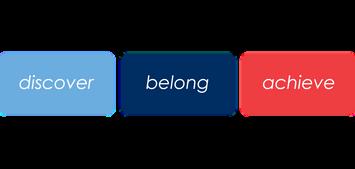
Overview
English is a compulsory subject from Prep to Year Twelve. English is divided into different English Pathways in Year Eleven, with students selecting a VCE English course, which may include English, Literature or both. All students must complete a VCE English subject at VCE.
Aims
English aims to ensure that students:
learn to listen, read, view, speak, write, create and reflect on increasingly complex and sophisticated spoken, written and multimodal texts across a growing range of contexts with accuracy, fluency and purpose appreciate, enjoy and use the English language in all its variations and develop a sense of its richness and power to evoke feelings, convey information, form ideas, facilitate interaction with others, entertain, persuade and argue understand how Standard Australian English works in its spoken and written forms and in combination with non-linguistic forms of communication to create meaning develop interest and skills in inquiring into the aesthetic aspects of texts and develop an informed appreciation of literature
Assessment
A range of assessment tasks is used and includes essay writing, comparative, persuasive, language analysis and oral presentations, as well as homework tasks to consolidate learning
Areas of Study
Year Nine
Strand
Listening, Reading and Viewing
Speaking, Writing and Creating
Year Ten
Strand
Listening, Reading and Viewing
Speaking, Writing and Creating
Learning Activities
Semester One Text study Short stories
Semester One
Creative, Analytical, Persuasive, Comparative Writing
Oral Communication and Formal Presentations
Read, View, Analyse and Respond to a Range of Texts
Assessment Criteria
Semester Two
Language analysis
Film text
Text study
Semester Two
Crafting text
Text study Language analysis
The following criteria are used in assessment, though not all criteria are used for each task:
Response to Text
Oral Communication
Examination

Geography
Overview
Geography is a compulsory subject from Prep to Year Ten. Students may select to continue their study of Geography as part of the VCE course in Year Eleven and Twelve
Aims
Geography aims to ensure that students develop:
a sense of wonder, curiosity and respect about places, people, cultures and environments throughout the world
a deep geographical knowledge of their own locality, Australia, the Asia region and the world the ability to think geographically, using geographical concepts the capacity to be competent, critical and creative users of geographical inquiry methods and skills as informed, responsible and active citizens who can contribute to the development of an environmentally and economically sustainable, and socially just world evaluate and consider sustainable use of our resources
Assessment
A range of assessment tasks is used and includes research assignments, topic tests, short answer questions, oral presentations, data analysis and representation and investigations
Areas of Study
Year Nine Strand
Geographical Understanding Geographical Inquiry Semester One Sustainability of Biomes Food Production Semester Two
Interconnection - the Interlinking of Systems in the Physical and Human World
Year Ten Strand
Geographical Understanding Geographical Inquiry Semester One Human Wellbeing - Global, National and Local Semester Two Environmental Changes
Learning Activities
Year Nine: Food Security
Year Ten: Development of Local Wellbeing Surveys and Working with Local Councils
Assessment Criteria
The following criteria are used in assessment, though not all criteria are used for each task:
Change Over Time
Sustainability
Environment

Health and Physical Education
Overview
Health and Physical education is a compulsory subject from Prep to Year Ten Students may select to continue their study of Physical Education or Health and Human Development as part of the VCE course in Year Eleven and Twelve
Aims
Health and Physical Education aims to ensure that students:
access and evaluate information to take positive action to protect, enhance and advocate for their own and others’ health, wellbeing, safety and physical activity participation across their lifespan develop and use personal, behavioural, social and cognitive skills and strategies to promote a sense of personal identity and wellbeing and to build and manage respectful relationships engage in and enjoy regular movement-based learning experiences and understand and appreciate their significance to personal, social, cultural, environmental and health practices and outcomes analyse how varied and changing personal and contextual factors shape understanding of, and opportunities for, health and physical activity locally, regionally and globally
Assessment
In Physical Education classes students are assessed on their overall organization, sports specific skills, tactics and level of intensity shown in a range of different sports. Students also conduct self-assessments in both athletics and fitness. In Health, students are assessed on various group and individual assignments and on how well they contribute to group discussions.
Areas of Study
Year Nine
Year Ten
Semester One
Mental Health, Positive Coping and Cyber Safety
Athletics, Ultimate Frisbee, Swimming, Baseball/Softball, Touch Football
Semester One
Determinants of Health, Emotional Literacy, Personal Strengths, Alcohol, Drugs and Gambling
Student Directed Curriculum

Semester Two
Help seeking, Safe relationships, Advertising and Healthy Eating Student Directed Learning (SPEP), Soft Lacrosse, Minor Games
Semester Two
Drugs, Party Safe, Headspace, Health Promotion, Safe Relationships
Student Directed House Competition
History
Overview
History is a compulsory subject from Prep to Year Ten. Students may select to continue their study of History as part of the VCE course in Year Eleven and Twelve.
Aims
History aims to ensure that students:
have interest in, and enjoyment of, historical study for lifelong learning and work, including their capacity and willingness to be informed and active citizens have knowledge, understanding and appreciation of the past and the forces that shape societies, including Australian society understand and use historical concepts such as evidence, continuity and change, cause and effect, significance, perspectives, empathy and contestability have the capacity to undertake historical inquiry, including skills in the analysis and use of sources, and in explanation and communication
Assessment
A range of assessment tasks is used and includes research assignments, topic tests, short answer questions, oral presentations, source analyses, and representation and investigations.
Areas of Study
Year Nine
Strand
Historical Knowledge and Understanding Historical Inquiry and Skills
Year Ten
Strand
Historical Knowledge and Understanding Historical Inquiry and Skills
Learning Activities
Yeddonba Aboriginal Cultural Site
The Holocaust Centre
Assessment Criteria
Semester One Overview and the Impact of the Industrial Revolution Movement of People
Semester One
Pre-World War Two Nazi Germany World War Two (Pacific and European Theatres of War)
Semester Two
The Making of Australia World War One
Semester Two
The Cold War
The Vietnam War Indigenous Rights and Freedoms Migration Experiences
The following criteria are used in assessment, though not all criteria are used for each task:
Cause and Effect
Contestability
Continuity and Change
Empathy
Perspectives
Evidence
Significance

Mathematics
Overview
Mathematics is a compulsory subject from Prep to Year Ten. Mathematics is divided into different Maths Pathways in Year Ten, preparing students for the different Maths pathway options from Year Eleven onwards.
Aims
Mathematics aims to ensure that students:
are confident, creative users and communicators of mathematics, able to investigate, represent and interpret situations in their personal and work lives and as active citizens develop an increasingly sophisticated understanding of mathematical concepts and fluency with processes, and are able to pose and solve problems and reason in number and algebra, measurement and geometry, and statistics and probability recognise connections between the areas of mathematics and other disciplines and appreciate mathematics as an accessible and enjoyable discipline to study
Assessment
A range of assessment tasks is used and includes assignments, topic tests, homework tasks and investigations
Areas of Study
Year Nine
Strand Number Algebra Measurement Space Statistics & Probability
Year Ten
Strand Tertiary Mathematics
General Mathematics Foundation Mathematics
Learning Activities
Topic Tests
Assignments
Project Work/Investigations
Problem Solving/Modelling
Assessment Criteria
Semester One
Financial Mathematics Algebra Pythagoras Theorem Trigonometry Measurement
Semester One
Measurement, Linear Relations, Indices, Surds, Probability
Measurement, Linear Relations, Trigonometry Geometry
Patterns and Number, Data and Measurement, Financial Literacy
Semester Two
Linear Relations
Geometric Reasoning Indices & Surds Statistics & Probability
Semester Two
Trigonometry, Quadratic Equations, Parabols & Other Graphs
Probability, Statistics, Indices
Patterns and Number, Data and Financial Literacy - taxation, Space, Shape and Design, Student Investigation
The following criteria are used in assessment, though not all criteria are used for each task:
Knowledge and Understanding Investigation and Problem Solving Estimation and Analysis

Pathways in Mathematics at CCW
Unit 1& 2
Specialist
Year Ten Tertiary Mathematics
Year Nine
Mathematics
Average of 75%+ on assessments
Mathematics (Along with Mathematical Methods)
Unit 1 & 2
Mathematical Methods
Year Nine
Mathematics
Average of between 40% - 75% on assessments
Year Ten General Mathematics
Unit 1 & 2 General Mathematics
Year Nine
Mathematics
Students who have traditionally found Mathematics difficult
Unit 1 & 2 Foundation Mathematics Year Ten Foundation Mathematics
Please note: if you chose to study Specialist Mathematics, it is compulsory to study Mathematical Methods as well.

Unit 3 & 4
Specialist
Mathematics (along with Mathematical Methods)
Unit 3 & 4
Mathematical Methods
Unit 3 & 4 General Mathematics
Unit 3 & 4 Foundation Mathematics
Religious and Values Education
Overview
Religious and Values Education is a compulsory subject from Prep to Year Ten.
Aims
Religious and Values Education aims to ensure that students:
gain knowledge and understanding of Christian and other theistic religions deepen their understanding of others and themselves engage with, and reflect on, fundamental questions of life acknowledge the wonders of creation and appreciate the responsibility on us all of the stewardship of God’s creation develop critical thinking skills which can be used to challenge, justify and clarify statements develop the capacity to listen to the opinions of others and respond in a constructive and meaningful way develop an appreciation of the value of stillness, of awe and wonder, nurture their own sense of spirituality, and that they may discover a sense of faith in God
Assessment
A range of assessment tasks is used relating to areas of study and includes research assignments, topic tests, short answer questions, and oral presentations. RAVE is reported on in line with other gradable subjects in Middle School and Senior School.
Areas of Study
Year Nine

Science
Overview
Science is a compulsory subject from Prep to Year Ten Science is taught as a single subject although students are exposed to units of Biology, Chemistry, Physics and Psychology before making VCE subject selections in Year Eleven
Aims
an understanding of the nature of scientific inquiry and the ability to use a range of scientific inquiry methods, including questioning; planning and conducting experiments and investigations based on ethical principles; collecting and analysing data; evaluating results; and drawing critical, evidence-based conclusions
an ability to communicate scientific understanding and findings to a range of audiences, to justify ideas on the basis of evidence, and to evaluate scientific arguments and claims
an ability to solve problems and make informed, evidence-based decisions about current and future applications of science while taking into account ethical and social implications
Assessment
A range of assessment tasks is used and includes research assignments, practical tests, scientific posters, oral presentations, models and practical reports
Areas of Study
Year Nine
Year Ten
Learning Activities
Laboratory Reports Research Presentations
Student-Designed Investigation
Assessment Criteria
The following criteria are used in assessment, though not all criteria are used for each task:
Science for Understanding
Science as a Human Endeavour

Pathways at Cathedral College
We are fortunate to live at a time when there are so many possibilities and pathways available to enter professions after school This then means you can use your experiences, interests, and strengths to help you plan a pathway into a range of occupations Many students do not know what they would like to do, and even if they do this may change over time By researching and exploring the range of opportunities available you can keep your options open
Students complete “Units of Study” in a variety of subjects Like all schools, the College does not offer the full range of (over 100) accredited VCE Subjects, and so some students may wish to enrol in a subject via either the Distance Education Centre of Victoria or the Victorian School of Languages These enrolments incur an additional cost, to which the College contributes We support students’ Vocational Education and Training by offering students the ability to combine a School-Based Apprenticeship/Traineeship or VETis (Vocational Education and Training in Schools) course with their core studies These usually involve one day per week out of school either at a workplace or TAFE
We also offer students the option to complete their VCE program over three years, although the major component of the VCE is undertaken when students are in Years Eleven and Twelve Students may complete their VCE as an ATAR or Vocational Major
Possible Pathways
Year Eleven
Year
Twelve
VCE - ATAR
English Maths, plus 3 or 4 VCE/VET
VCE - ATAR
VCE - ATAR or non-ATAR
English Maths, plus 3 VCE/VET
VCE - Non-ATAR (including VET or SBAT) English (differentiated) Maths (Foundation), plus 3 VET/VCE/SBAT
VCENon-ATAR or Vocational Major 2025
After School
University ATAR Course
University or College Course - Portfolio or early entry
Diploma or Certificate IV TAFE or Work Force

ELECTIVES
Students select electives for each semester - one from the six-period block and one from the ten-period blocks. Fast Tracking subjects run all year. Subject content will be modified according to whether the subject runs for six or ten periods.
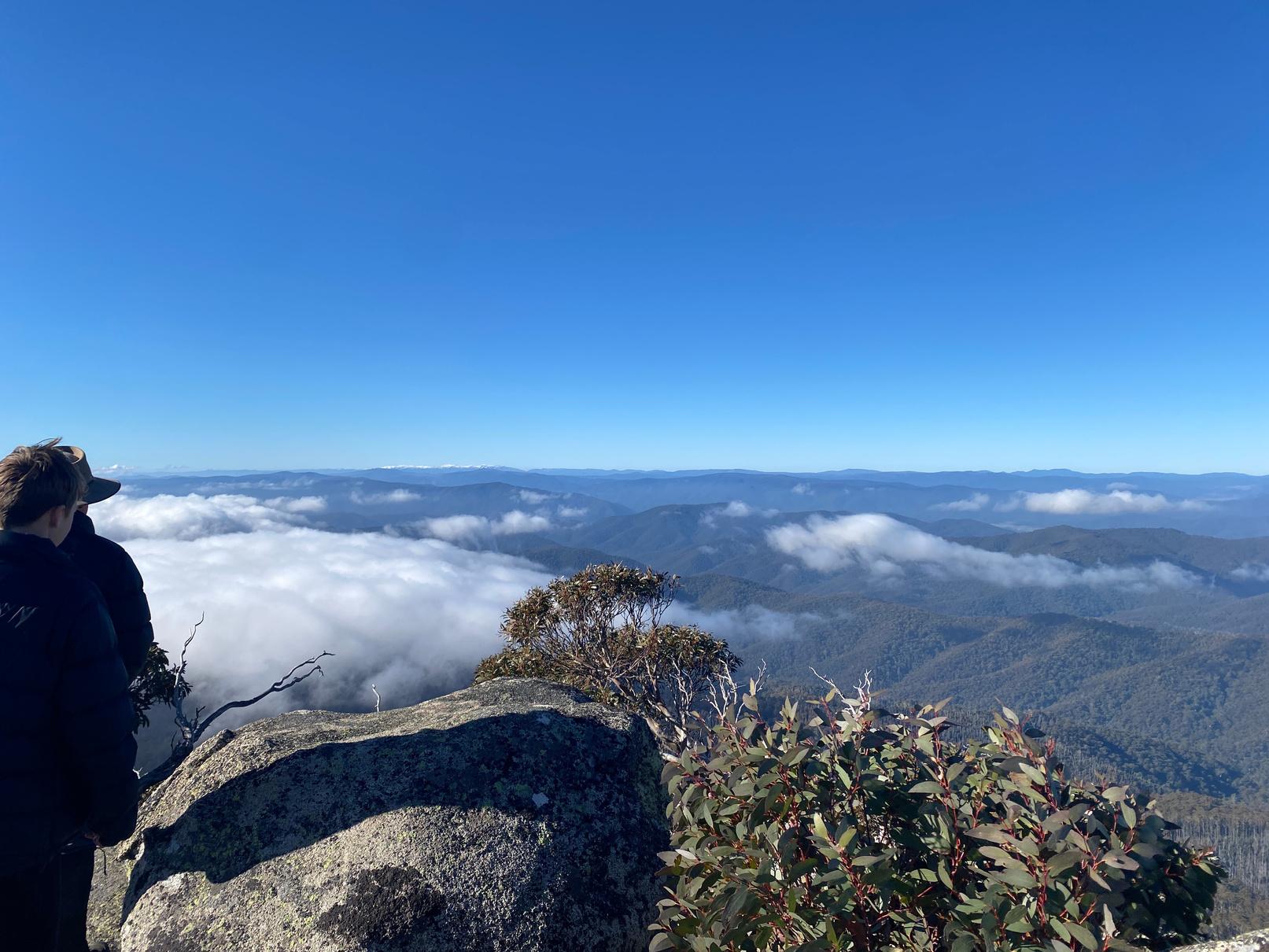

Business Management and Legal Studies
Overview
Business Management is an elective subject introduced at Year Nine. Students may Fast Track VCE Business Management in Year Ten or select VCE Business Management in Year Eleven and Twelve.
Aims
Participation in a Business Management elective will enable students to:
have an understanding of the work and business environments within the Australian economy and its interactions and relationships with the global economy, in particular, the Asia region use reasoning and interpretation skills to apply economics and business concepts to make informed decisions understand economics and business decision-making and its role in creating a prosperous, sustainable and equitable economy for all Australians enable them to actively and ethically participate in the local, national, regional and global economy as economically, financially and business-literate citizens
Assessment
Business Management electives are assessed using the below criteria:
Knowledge and Understanding Inquiry Skills
UnitsofStudy
Year Nine: Students can elect to study Business Management from one of the elective offerings:
Business Management:SemesterOne
Students explore the complexity, challenges and rewards that come from managing a business and gain an insight into the various ways resources are managed
Business Management:SemesterTwo
Students explore the complexity, challenges and rewards that come from managing a business and gain an insight into the various ways resources are managed
Year Ten: Students can elect to study Business Management from one of the elective offerings:
Business and Legal: Semesters One and Two
Students study Business Management and Legal Studies for a term each in this semester-long elective In Business Management, students explore contemporary issues in business and Australia's economic performance
During the Legal Studies unit, students develop an understanding of Australia's system of government through comparison with another system of government in Asia

Design and Technology
Overview
Design and Technology actively engage students in creating quality designed solutions for identified needs and opportunities across a range of technology contexts. Students manage projects independently and collaboratively from conception to realisation They apply design and systems thinking and design processes to investigate ideas, generate and refine ideas, and plan, produce and evaluate designed solutions They develop a sense of pride, satisfaction and enjoyment from their ability to develop innovative designed products, services and environments.
Aims
The study of a Design and Technology elective will enable students to:
develop confidence as critical users of technologies and designers and producers of designed solutions by producing designs in a range of materials, for a range of users investigate, generate and critique innovative and ethically designed solutions for sustainable futures evaluate processes and design solutions and transfer knowledge and skills to new situations
Assessment
Design and Technology electives are assessed using the below criteria:
Knowledge and Understanding Design and Production Skills
UnitsofStudy
Year Nine: Students can elect to study Design and Technology from one of the elective offerings:
Food Technology - Global Goodies:SemestersOne and Two
Students apply design and process skills to explore a range of cuisines and eating practices from around the world
Materials Technology:SemestersOne and Two
Students focus on designing and constructing a variety of projects based on an identified need.
Food Technology - Meals on the Menu: Semester One and Two
Students apply design and process skills to explore and produce meals for various times of the day and consider the dietary needs of consumers
Year Ten: Students can elect to study Design and Technology from one of the elective offerings:
Food Technology - Back to Basics: Semester One
Students explore more complex food challenges, evaluate end products and investigate cheap, healthy eats for youth Food sustainability and wastage are underlying themes Functional properties of foods and processing techniques are a focus.
Food Technology - Masterclass: Semester Two
Students create healthy food solutions whilst developing complex food preparation skills. Students prepare a wide range of challenging recipes and learn about the functional role of their ingredients Food trends and food presentation are also a focus
Materials Technology: Semesters One and Two
This is a student-negotiated elective in which students design and develop a project based on an identified need Students will investigate and make judgments on how the characteristics and properties of materials, systems, components, tools and equipment could be combined to create designed solutions They develop project plans, including the use of digital technologies, to plan and manage projects collaboratively, taking into consideration time, cost, risk and production processes. Students work independently and in small teams to design and produce storage solutions with timber, using equipment and processes with increasing complexity
Agriculture and Technology: Semesters One and Two
Students will investigate and make judgements on the ethical and sustainable production of food and fibre in Australia and internationally. They will compare production systems looking at the environmental impacts of intensive and extensive production systems Students will examine the profitability, sustainability and production systems of food and fibre locally and within Australia Students will discover new and emerging technologies in Agriculture which allow for increases in efficiencies and productivity that are at the forefront of Agricultural industries. Students will be exposed to on-farm expertise with a field trip to a local food or fibre producer This elective is a good head start if considering a pathway to VCE Agriculture or a career in this ever-expanding and diverse industry

Food Technology
Students can choose one elective per semester, there are no prerequisites to study any subject Studies of Year Ten classes are recommended prior to undertaking a VCE subject
Year Seven
Budding Chef (Semester One only)
Year Seven Eating for Health (Semester Two only)
Year Eight Good Food Fast
Year Nine Meals on a Menu Year Nine Social Enterprise Food Technology
Year Eight Lets Eat Local
Year Nine Global Goodies
Year Ten Back to Basics (Semester One only)
Unit 1 & 2 Food Studies
Unit 3 & 4 Food Studies
Year Ten Masterclass (Semester Two only)
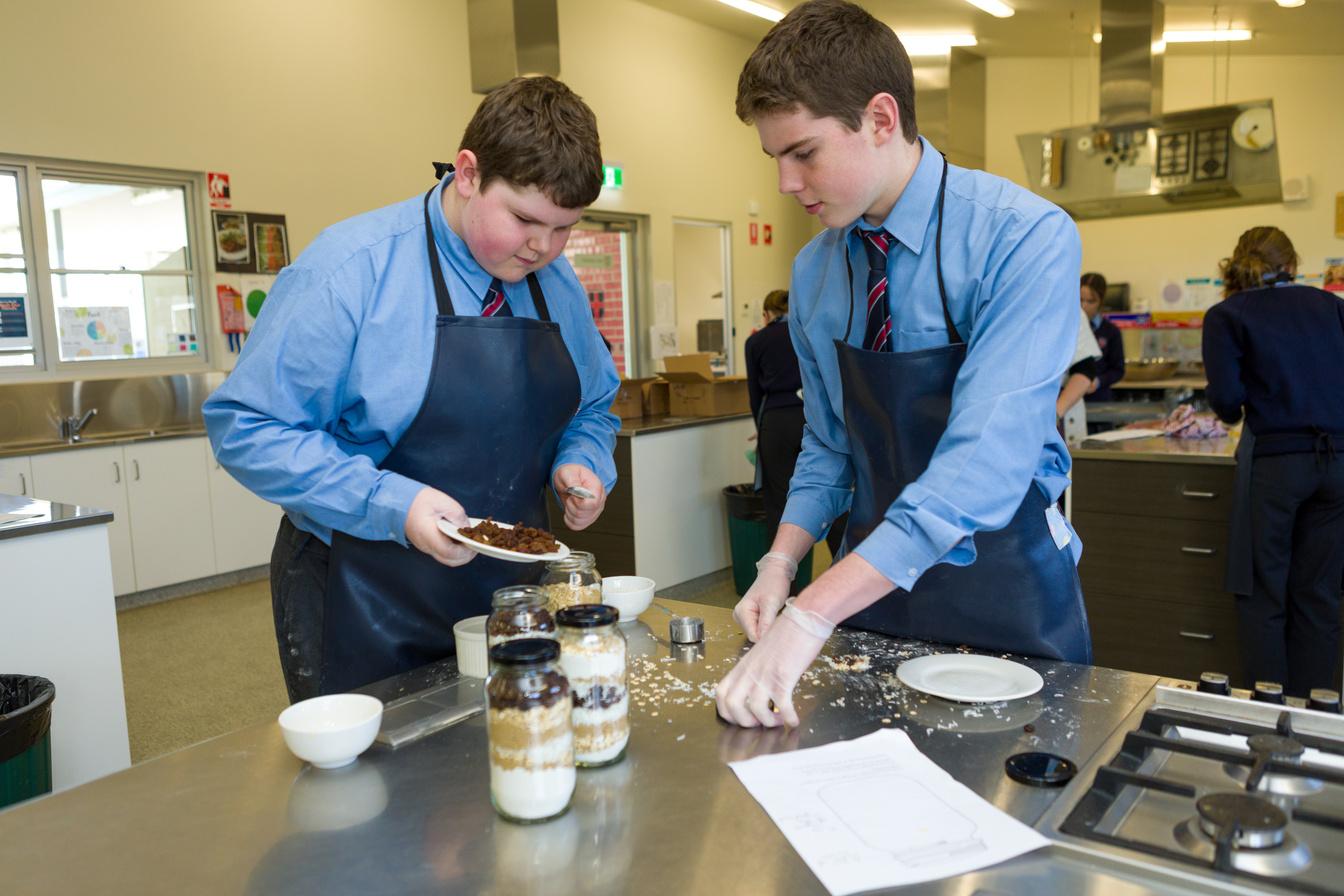

English Related Electives
Overview
Students often engage with English or Mathematical learning more when incorporated into the teaching and learning program in the context of ‘real life’ experiences. Learners apply what they have learnt by doing, experiencing or relating it to the real world. They are then able to see an immediate relevance. By nurturing and working with a student in a holistic manner, the course is adapted to take into account their personal strengths, interests, goals and previous experiences
WORK RELATED SKILLS
Aims
Participation in the Work Related Skills elective will enable students to:
see the relevance of mathematical and English concepts apply their skills and knowledge in real-world situations initiate learning goals and projects develop interpersonal skills in communication, problem-solving and evaluating organise and plan projects engage with school and community groups outside their peer group
Assessment
The Work Related Skills elective is assessed using the below criteria:
Personal development skills
Application of skills and knowledge
LITERATURE
Aims
Participation in the Literature elective will enable students to:
Provide a framework to intellectually stimulate and considerably extend the skills and capabilities of English, Arts and Humanities students
Improve the academic results of the upper ability bracket of both the VCE English and the VCE Literature classes
Assessment
Literature elective is assessed using the below criteria:
An Adaptive Text Response essay
A Close Analysis Response Piece
A Creative Text Response Piece
A final Academic Thesis Essay
UnitsofStudy
Year Nine: Students can elect to study Work Related Skills from one of the elective offerings:
Work Related Skills: Semesters One and Two
Planning and organising
Application of mathematical knowledge
Expressing information in a variety of forms
Personal goals and initiative
Year Ten: Students can elect to study Literature and Philosophy from one of the elective offerings:
Literature: Semesters One and Two
Deeper and broader thinking skills
Advanced reading, writing and speaking skills
Integrated mixed media technologies
Exploration of philosophical questions

Information Technology
Overview
Information Technology provides students with practical opportunities to use design thinking and to be innovative developers of digital solutions and knowledge. The subject helps students to become innovative creators of digital solutions, effective users of digital systems and critical consumers of information conveyed by digital systems. Hands-on learning provides students with authentic learning challenges that foster curiosity, confidence, persistence, innovation, creativity, respect and cooperation.
Aims
Participation in Information Technology enables students to:
design, create, manage and evaluate sustainable and innovative digital solutions to meet and redefine current and future needs confidently use information systems to efficiently and effectively automate the transformation of data into information and to creatively communicate ideas in a range of settings apply protocols and legal practices that support safe, ethical and respectful communications and collaboration with known and unknown audiences apply systems thinking to monitor, analyse, predict and shape the interactions within and between information systems and the impact of these systems on individuals, societies, economies and environments
Assessment
Information Technology subjects are assessed using the below criteria:
Knowledge and Understanding Processes and Production Skills
UnitsofStudy
Year Nine: Students can elect to study Information Technology from the elective offering:
Information Technology: Semester One
Students are introduced to a broad range of software and hardware skills and applications
Year Ten: Students can elect to study Information Technology from the elective offering:
Information Technology: Semester One
Students are introduced to a broad range of software and hardware skills and applications


Digital & Material Technologies
Students can choose up to two electives per semester, there are no prerequisites to study any subject Studies of Year Ten classes are recommended prior to undertaking a VCE subject


Language Other Than English (LOTE)
German
Overview
and Indonesian
A Language Other Than English is an elective subject in Year Nine and Ten Students who have studied German or Indonesian in Years Seven and Eight may continue their study of a second language throughout the senior years of schooling and elect to study the language at VCE in Year Eleven and Twelve
Aims
Participation in a second language study will enable students to:
communicate in a second language understand language, culture, and learning and their relationship, and thereby develop an intercultural capability in communication develop an understanding of other countries, their history, lifestyle and environments
Assessment
German and Indonesian Second Language subjects are assessed using the below criteria:
Communicating in the Language Understanding of the Language
UnitsofStudy
Year Nine: Students can elect to study a second language from one of the elective offerings:
German: Semester One and Two
Students study the four language skills: listening, speaking, reading and writing through a variety of topics. Students must study German in both semesters in order to study German at VCE.
Indonesian: Semester One and Two
Students extend their interest in the Indonesian culture and increase their proficiency in reading, writing, speaking and listening. Students must study Indonesian in both semesters in order to study Indonesian at VCE.
Year Ten: Students can elect to study a second language from one of the elective offerings:
German: Semester One and Two
Students continue to reinforce oral language skills needed for day to day living. Students are introduced to a variety of more complex German language conventions.
Indonesian: Semester One and Two
Students study more complex grammar structures while communicating with increased proficiency in written and oral forms. Students continue to read Indonesian from a variety of texts.

Media
Overview
Media enables students to create and communicate representations of diverse worlds, and investigate the impact and influence of media artworks on those worlds, individually and collaboratively As an art form evolving in the twenty-first century, Media both enables students to use existing and emerging technologies as they explore imagery, text and sound and create meaning as they participate in, experiment with and interpret diverse cultures and communications practices
Aims
Participation in Media enables students to:
gain enjoyment and confidence to participate in, experiment with and interpret the media-rich culture and communications practices that surround them foster creative and critical thinking and explore perspectives in media as producers and consumers develop aesthetic knowledge and a sense of curiosity and discovery as they explore imagery, text and sound to express ideas, concepts and stories for different audiences
Assessment
Media subjects are assessed using the below criteria:
Knowledge Skills, Techniques and Processes
UnitsofStudy
Year Nine: Students can elect to study Media from the elective offering:
Media: Semester Two
Students are introduced to software applications that allow them to produce media products Current media forms are also analysed and critically evaluated
Year Ten: Students can elect to study Media from the elective offering:
Media: Semester Two
Students study the theory and methods necessary to use media tools such as audio, video, animation and web creation software to generate multimedia presentations and websites


Performing Arts
Overview
The Performing Arts is a learning area that draws together related but distinct art forms While these art forms have close relationships and are often used in interrelated ways, each involves different approaches to arts practices and critical and creative thinking that reflect distinct bodies of knowledge, understanding and skills The curriculum examines past, current and emerging arts practices in each art form across a range of cultures and places
Aims
The study of Drama will enable students to:
develop confidence and self-esteem to explore, depict and celebrate human experience, take risks and challenge their own creativity through drama acquire knowledge and understanding in controlling, applying and analysing the elements, skills, processes, forms, styles and techniques of drama to engage audiences and create meaning This is achieved while exploring and playing roles and imagining situations, actions and ideas as drama makers and audiences
The study of Music will enable students to:
develop the confidence to be creative, innovative, thoughtful, skilful and informed musicians acquire skills to compose, perform, improvise, respond and listen with intent and purpose respect music and music practices across global communities, cultures and musical traditions
Assessment
Both Music and Drama subjects are assessed using the below criteria:
Knowledge Skills
UnitsofStudy
Year Nine: Students can elect to study Music or Drama from one of the elective offerings:
Drama: Semesters One and Two
Students explore and depict real and fictional worlds through the use of body language, gesture and space to make meaning as performers and audience
Music: Semesters One and Two
Students listen to, compose and perform a diverse range of musical styles
Year Ten: Students can elect to study Music or Drama from one of the elective offerings:
Music: Semesters One and Two
Students observe, evaluate and reflect on their own and others’ performances and begin to explore creative composition with simple arranging and improvisation techniques.
Drama: Semesters One and Two
Students explore and develop skills in improvisation, developmental voice and scriptwriting and production design.

Physical, Outdoor & Health Related Electives
Overview
Physical, Outdoor and Health related electives are offered to students from Year Seven to Ten Students may select to continue their study of Health and Human Development, Physical Education or Outdoor and Environmental Education as part of a VCE course in Year Eleven and Twelve
Aims
Participation in Physical, Outdoor and Health electives will enable students to:
access and evaluate information to take positive action to protect, enhance and advocate for their own and others’ wellbeing in a range of different environments develop and use personal, behavioural, social and cognitive skills and strategies to promote a sense of personal identity and wellbeing and to build and manage respectful relationships when working with others learn how to safely prepare themselves and their equipment for adventure and experience different types of activities
Assessment
Physical and Outdoor activity electives are assessed using the below criteria:
Personal, Social and Community health
Movement and Physical Activity
UnitsofStudy
Year Nine: Students can elect to study Physical and Outdoor Activities from one of the elective offerings:
Social Psychology and Health: Semester One and Two
Students explore the science of attraction and the different biological and environmental characteristics involved when getting to know someone They learn about techniques used in persuasive advertising and effective strategies to coerce and convince others
Introduction to Sport Pathways: Semester One or Two
Students gain an understanding of basic anatomy, different coaching practices, fitness components and fitness training methods
Outdoor Education: Semester One or Two
Students plan, prepare and lead activities that promote a sense of wellbeing and personal understanding
Year Ten: Students can elect to study Physical and Outdoor Activities from one of the elective offerings:
Outdoor Education: Semester One or Two
Students plan, prepare and lead activities that promote a sense of wellbeing and personal understanding.
Please see VET Sport and Recreation details

Psychology
Overview
Psychology electives are offered to students in Year Ten Students may select to continue their study of Psychology as part of a VCE course in Year Eleven and Twelve
Aims
Participation in Psychology electives will enable students to:
undertake a range of inquiry tasks both collaboratively and independently pose questions, formulate research hypotheses, collect and analyse data, evaluate methodologies and results, justify conclusions, make recommendations and communicate their findings gain an understanding of their bodies, brains, growth and developmental skills for learning
Assessment
Psychology electives are assessed using the below criteria:
Understanding Skills
UnitsofStudy
Year Ten: Students can elect to study Psychology from one of the elective offerings:
Psychology: Semester One or Semester Two
Students are introduced to factors that influence human thoughts, feelings, and behaviour such as personality and intelligence Through inquiry, students investigate, and explain memory, and explore abnormal psychology


Social Enterprise
Overview
A Social Enterprise is a business which contributes over half its profit toward social and environmental causes In Year Nine, students learn about social enterprise through one of three elective subjects These electives combine design and production ideas with business planning to operate an enterprise
Aims
Participation in a Social Enterprise elective will enable students to:
work collaboratively with fellow students to design, market and run an enterprise make connections between the enterprise and the needs of people in the local or broader community consider design, aesthetics and sustainability in developing a product for a target market evaluate the success of their skills and of the business
Assessment
Social Enterprise electives are assessed using the below criteria:
Inquiry and Research
Critical and Research Thinking
Teamwork and Communication
UnitsofStudy
Year Nine: Students can elect to study Social Enterprise from one of the elective offerings:
Social Enterprise: Semester One
Agriculture and Horticulture
Visual Arts
Food and Technology
Social Enterprise: Semester Two
Materials and Technology
Visual Arts
Food and Technology
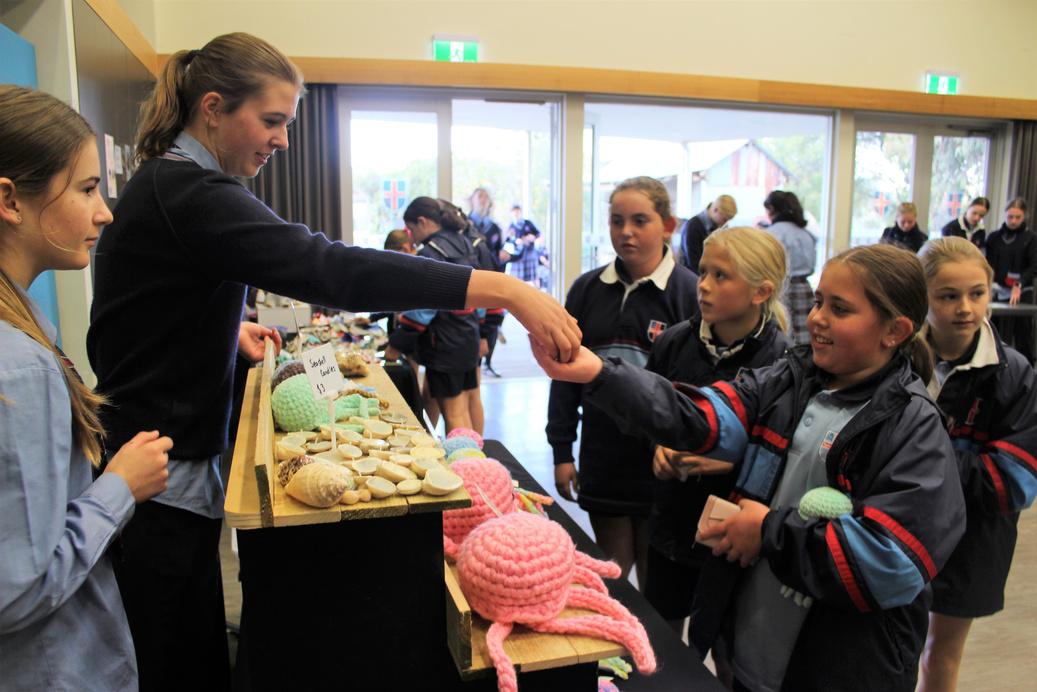

Visual Art
Students can choose up to two electives per semester, there are no prerequisites to study any subject. Studies of Year Ten classes are recommended prior to undetaking a VCE subject.


Visual Art
Overview
Visual Arts electives are offered to students from Year Seven to Ten. Students may select to continue their study of Creative Art or Visual Communication and Design as part of a VCE course in Year Eleven and Twelve.
Aims
Participation in Visual Arts will enable students to:
experience and develop curiosity, interest and enjoyment in their own creativity and that of others explore their world through the processes of the Visual Arts acquire and develop skills needed for the creation of works and expressing artwork use the terminology, concepts and principles of Visual Arts communicate their thoughts and ideas through Visual Arts create artworks document, reflect and evaluate artworks develop receptiveness to Visual Arts’ forms across time, place and cultures, and perceive the significance of these forms as an integral part of life
Assessment
Visual Arts and Design subjects are assessed using the below criteria:
Creating and Making Exploring and Responding
UnitsofStudy
Year Nine: Students can elect to study Visual Arts from one of the elective offerings:
Visual Communication Design: Semesters One and Two
Students develop and present visual communications that demonstrate the application of media, methods, materials, design elements and principles They use manual and digital drawing methods to create visual communications for specific audiences and needs
3D Art: Semester One
Students investigate the difference between two-dimensional and three-dimensional artwork and are introduced to a number of ways to explore ideas when making 3D artwork
Art Creative Practice: Semester Two
Emphasis is placed on building creative art skills, working through different stages of the creative practices, exploring art forms and developing personal ideas
Year Ten: Students can elect to study Visual Arts from the elective offerings:
Art Creative Practice: Semester One
Students explore a range of skills in Creative Art practices to develop an understanding of traditional and contemporary media, materials, equipment and technologies These ideas are used to create a body of work
Visual Communication Design: Semester Two
Students develop visual communication design skills, techniques, conventions and processes in a range of design fields They use manual and digital drawing methods to create visual communications for specific purposes, audiences and needs.

VCE VET Certificate III - Information Technology
Overview
The VCE VET Information Technology program is drawn from a national training package and offers portable qualifications which are recognised throughout Australia These qualifications provide students with a broad range of skills and knowledge to pursue a career or further training in related areas of information technology in a range of industry areas
Students who complete the two-year course are awarded Certificate III in Information Technology An excellent choice for students wishing to fast-track
The VCE VET Information Technology program equips learners with future-ready ICT skills and knowledge to prepare them for a successful ICT career ICT covers all areas related to processing, manipulating, and managing information, such as producing digital images, social media, operating software packages and website building
VCE VET Certificate III - Sport and Recreation
Overview
VET Sport & Recreation provides students with the skills and knowledge to work in the sport and recreation industries In Units One and Two, students will complete a range of different electives including sport-specific activities, planning and conducting sports and outdoor recreation events and planning and conducting fitness programs
Units Three and Four offer scored assessment and includes core units such as plan and conducting programs, undertaking risk assessments, facilitating groups and conducting coaching with foundation-level participants Leadership, organisational and specialist activity skills will be developed through the units of competency undertaken in the selected program
Over the two-year program, students will have the opportunity to gain their Level 2 First Aid Certificate, Level 1 Sports Trainers Certificate and Certificate III in Sport and Recreation Employment opportunities reflect roles such as Recreation Officer, Activity Operation Officer, Sport and Recreation Attendant, Community Activities Officer or Leisure Services Officer students will also have the opportunity to attend an overnight Sport and Recreation Melbourne Careers excursion and a three-day Mount Hotham Ski Camp
Students should only select one VCE or VET subject in Year Ten
VCE VET Certificate II - Active Volunteering
Overview
VET Active Volunteering provides students with the ability to engage with local community groups. Students will explore the varied dimensions of volunteering, basic emergency life support skills, communication and organisational skills to effectively equip themselves moving into a workforce post-secondary schooling. This is a one-year course and can lead to VET Certificate III in Community Services.

FAST TRACK - Biology
Prerequisites
C grade or above in Year Ten Science. Fast Track in Year Ten - B+ subject average in Core Subjects, with an A in Science.
Aim of the Course
The study of Biology enables students to:
explore biological concepts relating to microscopic organisms through to ecosystems and the way biological systems interact and are interrelated conduct fieldwork, laboratory activities, investigations and other research techniques which provide evidence-based information to analyse and problem solve biological questions
Description of the Course
Unit One: How do organisms regulate their functions?
Students examine the cell as the structural unit of life, from the single-celled to the multicellular organism, including the requirements for sustaining cellular processes Student focus on cell growth, replacement and death and the role of stem cells in differentiation specialisation and renewal of cells They explore how systems function through cell specialization in vascular plants and animals and consider the role homeostatic mechanisms play in maintaining an animal’s environment
Unit Two: How does inheritance impact on diversity?
Students will explore reproduction and the transmission of biological information from generation to generation and the impact this has on species diversity They apply their understanding of chromosomes to explain the process of meiosis Students consider how the relationship between genes, and the environment and epigenetic factors influence phenotypic expression They explain the inheritance of characteristics, analyse patterns of inheritance, interpret pedigree charts and predict outcomes of genetic crosses Students analyse the advantages and disadvantages of asexual and sexual reproductive strategies, including the use of reproductive cloning technologies They study structural, physiological and behavioural adaptations that enhance an organism’s survival Students explore interdependencies between species, focusing on how keystone species and top predators structure and maintain the distribution, density and size of a population They also consider the contributions of Aboriginal and Torres Strait Islander knowledge and perspectives in understanding the survival of organisms in Australian ecosystems

FAST TRACK - Physical Education
Prerequisites:
A minimum of a B grade in Year Ten Physical Education (core subject), English and Science. To Fast Track in Year Ten, students must gain a B+ in all Core Subjects.
Aim of the Course
The study of Physical Education enables students to:
use practical activities to underpin contemporary theoretical understanding of the influences on participation and performance in physical activity, sport and exercise develop an understanding of the anatomical, biomechanical, physiological and skill acquisition principles, and of behavioural, psychological, environmental and sociocultural influences on performance and participation in physical activity across the lifespan engage in physical activity and movement experiences to determine and analyse how the body systems work together to produce and refine movement
Description of the course
Unit One: The human body in motion
Students explore how the musculoskeletal and cardiorespiratory systems work together to produce movement Through practical activities, students explore the relationships between the body systems and physical activity, sport and exercise, and how the systems adapt and adjust to the demands of the activity They explore how the capacity and functioning of each system acts as an enabler or barrier to movement and participation in physical activity.
Unit Two: Physical activity, sport and society
Students are introduced to types of physical activity and the role participation in physical activity and sedentary behaviour plays in their own health and wellbeing as well as in other people’s lives in different population groups Through a series of practical activities, students experience and explore different types of physical activity promoted in their own and different population groups They gain an appreciation of the level of physical activity required for health benefits Students investigate how participation in physical activity varies across the lifespan. They explore a range of factors that influence and facilitate participation in regular physical activity.

FAST TRACK - Psychology
Prerequisites
C+ grade or above in Year Ten Science
Aim of the Course
The study of Psychology enables students to:
explore how people think, feel and behave through the use of a biopsychosocial approach; pose questions, formulate research hypotheses, operationalise variables, collect and analyse data, evaluate methodologies and results, justify conclusions, make recommendations and communicate their findings
Description of the Course
Unit One: How are behaviour and mental processes shaped?
Students investigate the structure and functioning of the human brain and the role it plays in the overall functioning of the human nervous system Students explore brain plasticity and the influence that brain damage may have on a person’s psychological functioning They consider the complex nature of psychological development over the life span and evaluate ways of understanding and representing psychological development
Unit Two: How do external factors influence behaviour and mental processes?
In this unit, students investigate how the perception of stimuli enables a person to interact with the world around them and how their perception of stimuli can be distorted. They evaluate the role social cognition plays in a person’s attitudes, perception of themselves and relationships with others. Students explore a variety of factors and contexts that can influence the behaviour of an individual and groups. They examine the contribution that classical and contemporary research has made to the understanding of human perception and why individuals and groups behave in specific ways.

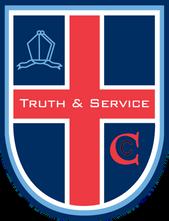
 Cathedral
College Wangaratta
Cathedral
College Wangaratta
